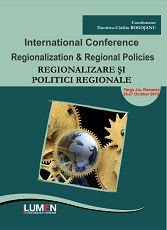Retrospectivă şi prezent în privinţa regionalizării României
Retrospective currently on regionalization Romania
Author(s): Moise Bojincă
Subject(s): Politics / Political Sciences
Published by: Editura Lumen, Asociatia Lumen
Keywords: region; regionalization; region development; administrative and territorial organization; County.
Summary/Abstract: For Romania the idea of regionalization is not a new one. Regionalism has an old tradition here. Since the middle ages, beginning in the 10th century, it is mentioned the existence of the four administrative units that correspond to the current Romanian historical provinces: Moldavia, Wallachia, Transylvania and Dobruja. It is considering in this situation, this regionalism is like a movement from the bottom up, in which the region is perceived by the inhabitants as a homogeneous territory which represents the awareness of their common interests and aspirations of participating in the management of such interests but not of regionalisation which involves a reverse approach, from top to bottom.The current form of national State dates from 1 December 1918, when Transylvania was United with Wallachia.Nowadays, various forms of regionalisation are discussed, more or less in accordance with our country's needs, but whose main argument is the necessity of meeting the economic, social, environmental and cultural needs of the population. Regionalization is related to a number of other issues such as decentralisation, the transfer of skills and resources from the regional throw up a national level that could influence, positively as well as negatively, both the national security, but also the process of governance, with profound implications on the population.At the same time increasingly salient manifestation of opposing and even contradictory trends which claim precedence such as: fragmentation and integration; localization-internationalization; protectionism-liberalization; decentralization-centralization amid changes in demographics, climate change, economic crisis and social polarisation, confers special connotations of regionalization. The regionalization process is complex and highly sensitive. Its coexistence with globalization, as well as with a number of concepts such as: region, regionalism, regional identity and consciousness, regional integration, which is still ambiguous definition determines the need for a detailed analysis of its influence on all areas of social life.The regionalization process is complex and highly sensitive. Its coexistence with globalization, as well as with a number of concepts such as: region, regionalism, regional identity and consciousness, regional integration, which is still ambiguous definition determines the need for a detailed analysis of its influence on all areas of social life.To our knowledge, at present, public agenda in Romania are some scenarios of regionalization, but none of them does not meet the agreement of the majority of specialists.The problem is even more complicated as, in terms of the current territorial organization of the regions, our country is characterized by a few key vulnerabilities as well as the sharp decline in the number and ageing of the population, migration and international integration, unemployment, etc., which correlates with the increasingly more common to goods and people.What we are concerned, we believe that the existing administrative-territorial organization on counties best matches against Romania and ensures the greatest possible approximation of a citizen. The current regions without becoming the administrative-territorial units with legal personality may well constitute pole of attraction of financial resources that contribute to the balanced development of the country.Regionalisation should not represent an experiment whose costs and benefits are uncertain and unpredictable, and that affects the population in favor of integrative comfort.The work achieves a succinct historical foray from 1859 to the present and is meant to highlight the fact that the problem of administrative-territorial organisation of Romania has a permanent concern of the Romanian authorities and suggests that the Organization on counties and regions is not our country.
Book: Regionalizare şi politici regionale
- Page Range: 25-38
- Page Count: 14
- Publication Year: 2014
- Language: Romanian
- Content File-PDF

